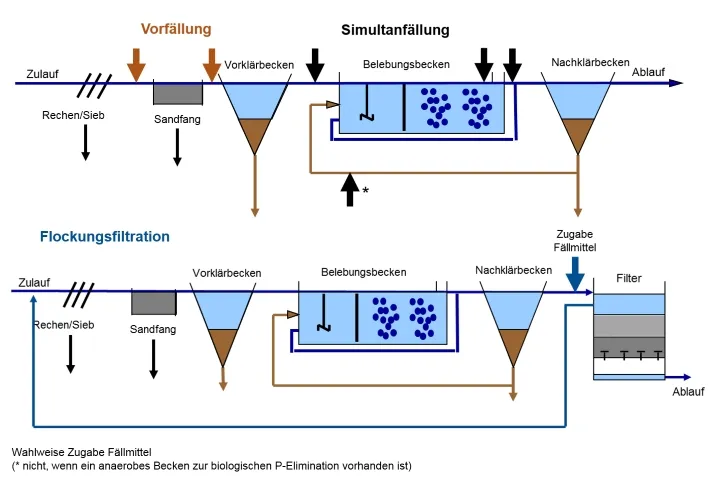Assessment of advanced phosphor elimination in municipal sewage treatment plants
Due to the latest surface waters regulation (Oberflächengewässerverordnung), a new benchmark for total phosphor emissions has recently been introduced. High concentrations of phosphor can lead to eutrophication of surface waters, therefore negatively affecting the aquatic environment. This has led to a greater emphasis on phosphor elimination in municipal sewage treatment plants within the last years since their discharges are defined as point sources for phosphor. The current technical guideline exhibits obvious gaps for phosphor eliminations aiming thresholds below 0.5 mg/L.
The aim of this research project funded by the Bavarian Environment Agency (AZ: 67-0270-34797/2016) is to realize an inventory of existing technical measures and implementations of advanced phosphor elimination in municipal sewage treatment plants as well as review and analyze the possible courses of action. This encompasses both chemical and biological treatments as well as process combinations including mechanical-physical separation processes for precipitation products.
In a first step, a comprehensive literature review will be conducted. In a second step, an inventory of existing sewage treatment plants within the German-speaking regions will be executed and technical experiences (including inspection) of selected plants will be collected and evaluated. Afterwards, the applicability of the attained findings for other municipal sewage treatment plants, in particular in Bavaria, will be reviewed. Depending on the type and size of the sewage treatment plant, specific investment and operational costs will be ascertained and also estimated for future implementation in municipal sewage treatment plants. Besides data collection, it will be assessed whether the combination of advanced phosphor elimination and potential treatment steps for the elimination of organic micropollutants is meaningful. Great importance will also be given to the detection of operational problems, for example the formation of magnesium ammonium phosphate (MAP).
The research project runs from July 2016 until July 2017 and will be executed in collaboration with Fa. Dr.-Ing. Steinle Ingenieurgesellschaft für Abwassertechnik mbH, Weyern.
